Business Law Assignment: Contract Law between Damien and Bryce
VerifiedAdded on 2021/06/17
|8
|2080
|56
Homework Assignment
AI Summary
This assignment analyzes a business law scenario involving Damien and Bryce, focusing on the formation of a valid contract. The analysis examines the elements of consideration and intention to create legal relations, referencing relevant case law such as Esso Petroleum Ltd v Commissioners of Customs and Excise, Ermogenous v Greek Orthodox Community of SA Inc, and Todd v Nicol. The assignment also explores the components of a valid agreement, specifically the concepts of offer and acceptance, as illustrated by cases such as Harvey v Facey and Carlill v Carbolic Smoke Ball Co. The analysis concludes that a valid agreement was established between Damien and Bryce, as both the elements of offer and acceptance, along with consideration and intention, were met. The document provides a detailed explanation of how the legal principles apply to the given facts, citing relevant legal precedents to support each argument.
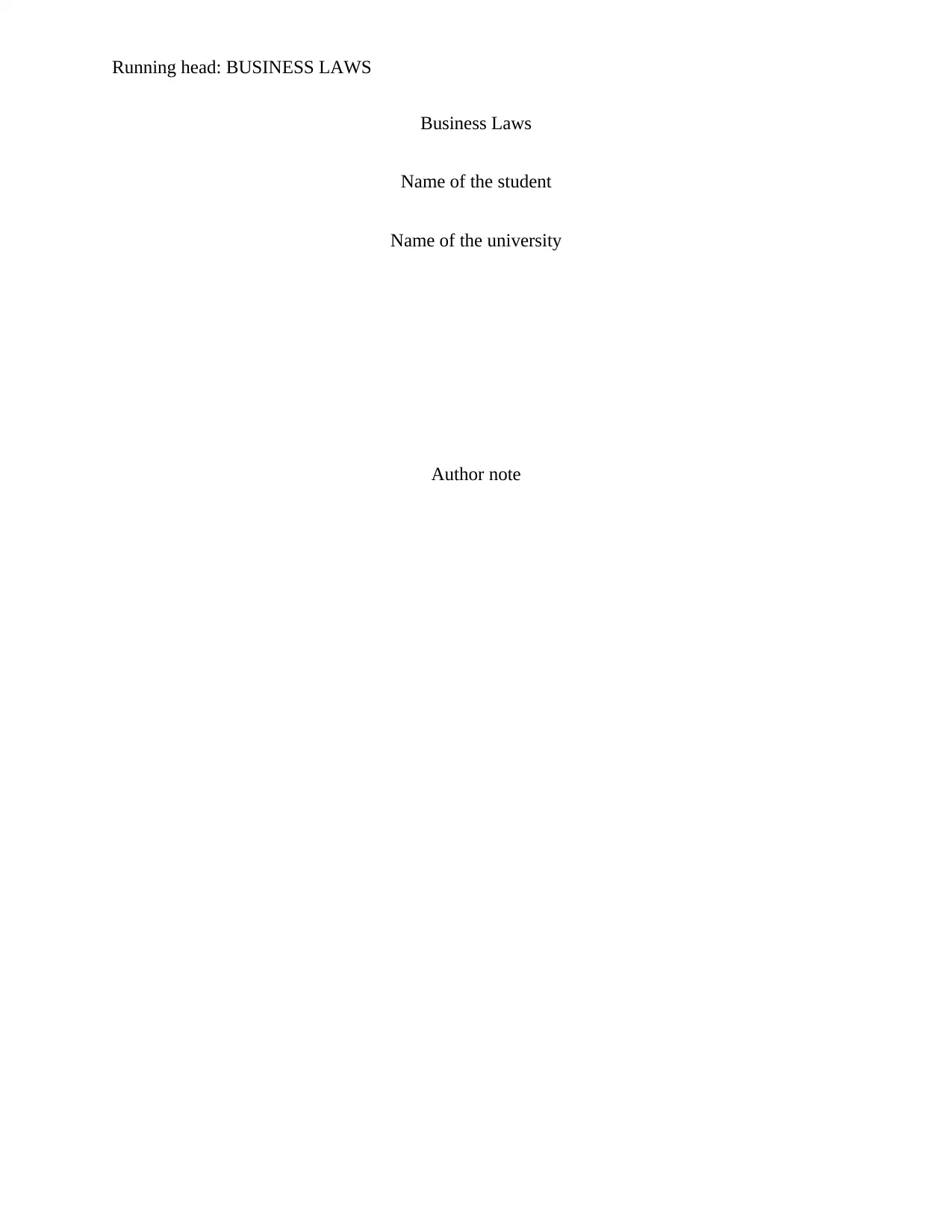
Running head: BUSINESS LAWS
Business Laws
Name of the student
Name of the university
Author note
Business Laws
Name of the student
Name of the university
Author note
Paraphrase This Document
Need a fresh take? Get an instant paraphrase of this document with our AI Paraphraser
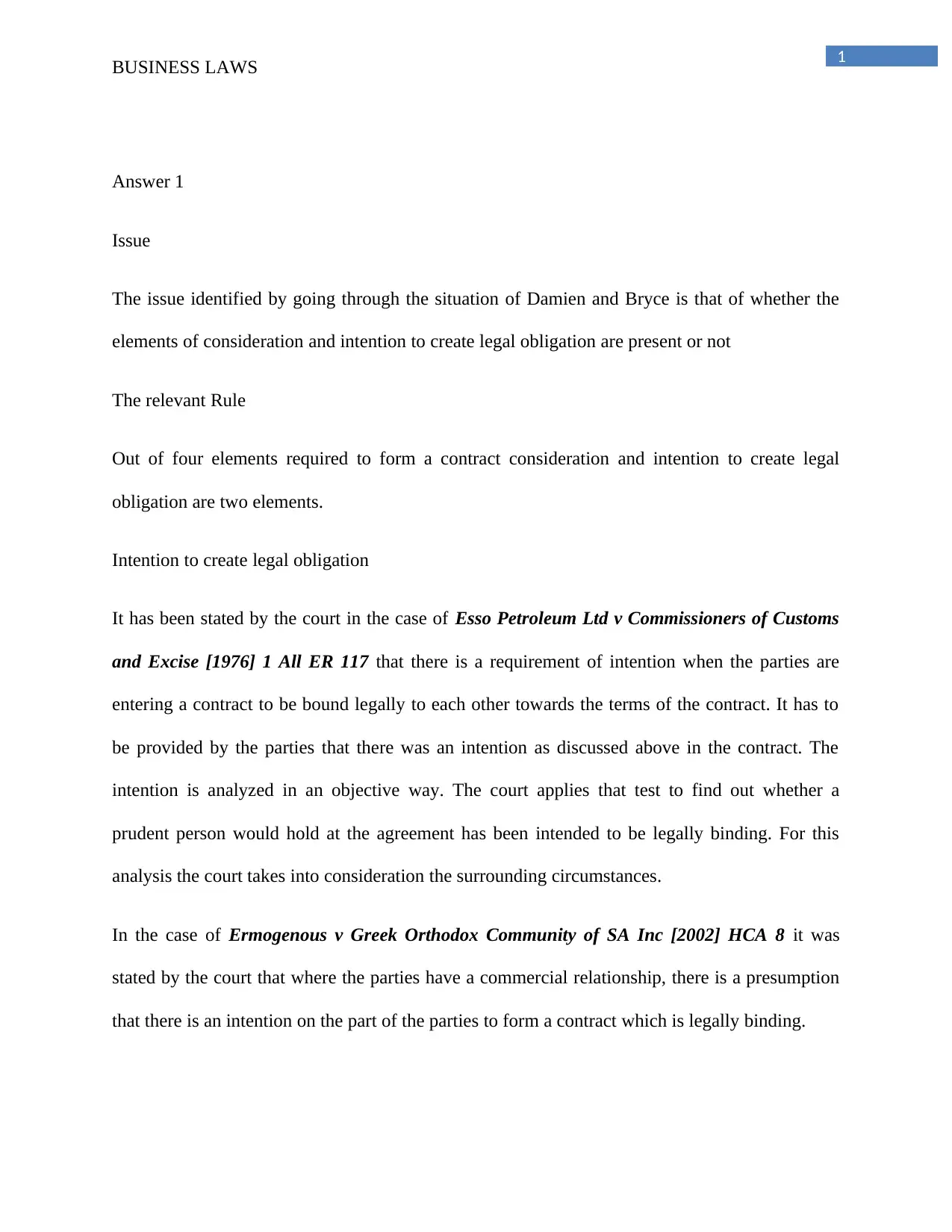
1
BUSINESS LAWS
Answer 1
Issue
The issue identified by going through the situation of Damien and Bryce is that of whether the
elements of consideration and intention to create legal obligation are present or not
The relevant Rule
Out of four elements required to form a contract consideration and intention to create legal
obligation are two elements.
Intention to create legal obligation
It has been stated by the court in the case of Esso Petroleum Ltd v Commissioners of Customs
and Excise [1976] 1 All ER 117 that there is a requirement of intention when the parties are
entering a contract to be bound legally to each other towards the terms of the contract. It has to
be provided by the parties that there was an intention as discussed above in the contract. The
intention is analyzed in an objective way. The court applies that test to find out whether a
prudent person would hold at the agreement has been intended to be legally binding. For this
analysis the court takes into consideration the surrounding circumstances.
In the case of Ermogenous v Greek Orthodox Community of SA Inc [2002] HCA 8 it was
stated by the court that where the parties have a commercial relationship, there is a presumption
that there is an intention on the part of the parties to form a contract which is legally binding.
BUSINESS LAWS
Answer 1
Issue
The issue identified by going through the situation of Damien and Bryce is that of whether the
elements of consideration and intention to create legal obligation are present or not
The relevant Rule
Out of four elements required to form a contract consideration and intention to create legal
obligation are two elements.
Intention to create legal obligation
It has been stated by the court in the case of Esso Petroleum Ltd v Commissioners of Customs
and Excise [1976] 1 All ER 117 that there is a requirement of intention when the parties are
entering a contract to be bound legally to each other towards the terms of the contract. It has to
be provided by the parties that there was an intention as discussed above in the contract. The
intention is analyzed in an objective way. The court applies that test to find out whether a
prudent person would hold at the agreement has been intended to be legally binding. For this
analysis the court takes into consideration the surrounding circumstances.
In the case of Ermogenous v Greek Orthodox Community of SA Inc [2002] HCA 8 it was
stated by the court that where the parties have a commercial relationship, there is a presumption
that there is an intention on the part of the parties to form a contract which is legally binding.
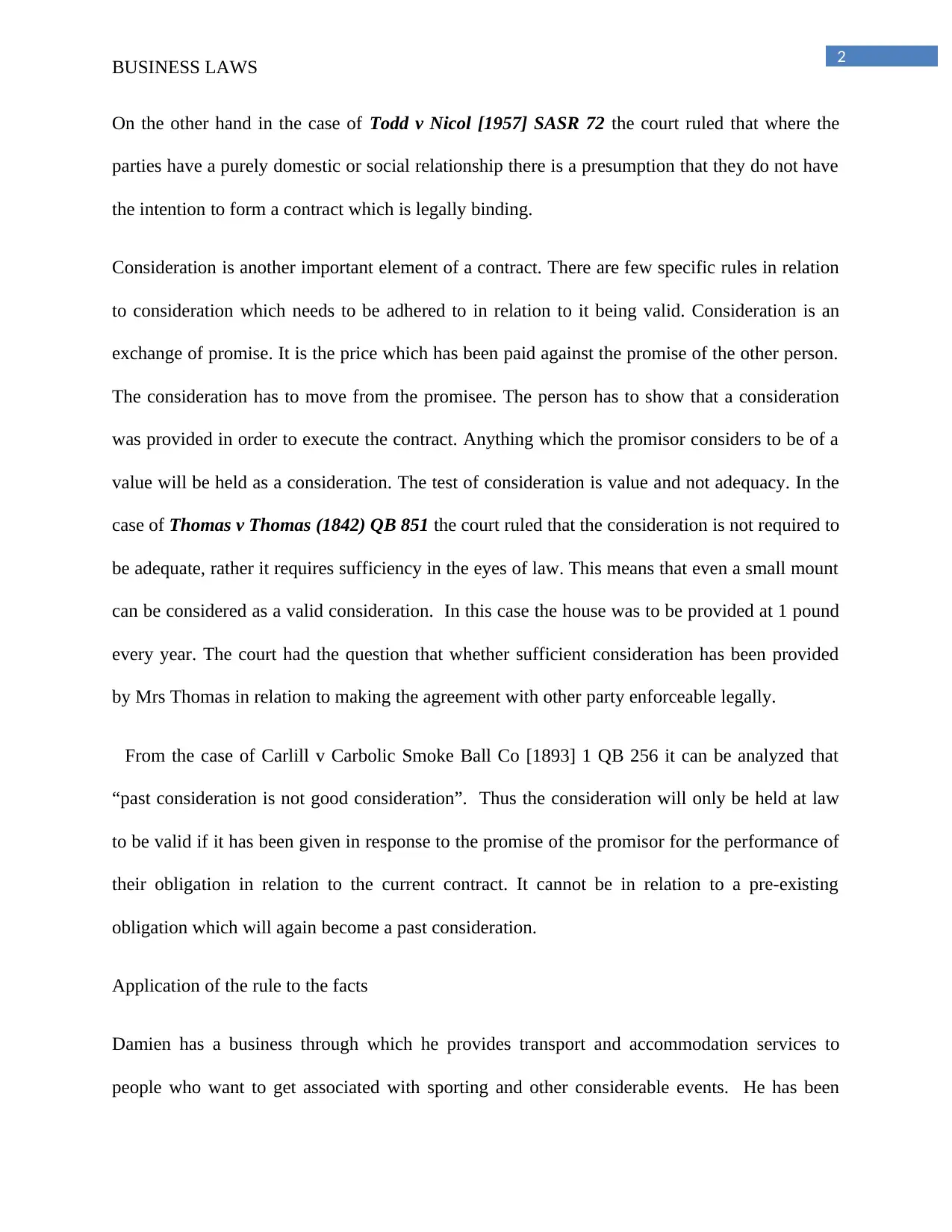
2
BUSINESS LAWS
On the other hand in the case of Todd v Nicol [1957] SASR 72 the court ruled that where the
parties have a purely domestic or social relationship there is a presumption that they do not have
the intention to form a contract which is legally binding.
Consideration is another important element of a contract. There are few specific rules in relation
to consideration which needs to be adhered to in relation to it being valid. Consideration is an
exchange of promise. It is the price which has been paid against the promise of the other person.
The consideration has to move from the promisee. The person has to show that a consideration
was provided in order to execute the contract. Anything which the promisor considers to be of a
value will be held as a consideration. The test of consideration is value and not adequacy. In the
case of Thomas v Thomas (1842) QB 851 the court ruled that the consideration is not required to
be adequate, rather it requires sufficiency in the eyes of law. This means that even a small mount
can be considered as a valid consideration. In this case the house was to be provided at 1 pound
every year. The court had the question that whether sufficient consideration has been provided
by Mrs Thomas in relation to making the agreement with other party enforceable legally.
From the case of Carlill v Carbolic Smoke Ball Co [1893] 1 QB 256 it can be analyzed that
“past consideration is not good consideration”. Thus the consideration will only be held at law
to be valid if it has been given in response to the promise of the promisor for the performance of
their obligation in relation to the current contract. It cannot be in relation to a pre-existing
obligation which will again become a past consideration.
Application of the rule to the facts
Damien has a business through which he provides transport and accommodation services to
people who want to get associated with sporting and other considerable events. He has been
BUSINESS LAWS
On the other hand in the case of Todd v Nicol [1957] SASR 72 the court ruled that where the
parties have a purely domestic or social relationship there is a presumption that they do not have
the intention to form a contract which is legally binding.
Consideration is another important element of a contract. There are few specific rules in relation
to consideration which needs to be adhered to in relation to it being valid. Consideration is an
exchange of promise. It is the price which has been paid against the promise of the other person.
The consideration has to move from the promisee. The person has to show that a consideration
was provided in order to execute the contract. Anything which the promisor considers to be of a
value will be held as a consideration. The test of consideration is value and not adequacy. In the
case of Thomas v Thomas (1842) QB 851 the court ruled that the consideration is not required to
be adequate, rather it requires sufficiency in the eyes of law. This means that even a small mount
can be considered as a valid consideration. In this case the house was to be provided at 1 pound
every year. The court had the question that whether sufficient consideration has been provided
by Mrs Thomas in relation to making the agreement with other party enforceable legally.
From the case of Carlill v Carbolic Smoke Ball Co [1893] 1 QB 256 it can be analyzed that
“past consideration is not good consideration”. Thus the consideration will only be held at law
to be valid if it has been given in response to the promise of the promisor for the performance of
their obligation in relation to the current contract. It cannot be in relation to a pre-existing
obligation which will again become a past consideration.
Application of the rule to the facts
Damien has a business through which he provides transport and accommodation services to
people who want to get associated with sporting and other considerable events. He has been
⊘ This is a preview!⊘
Do you want full access?
Subscribe today to unlock all pages.

Trusted by 1+ million students worldwide
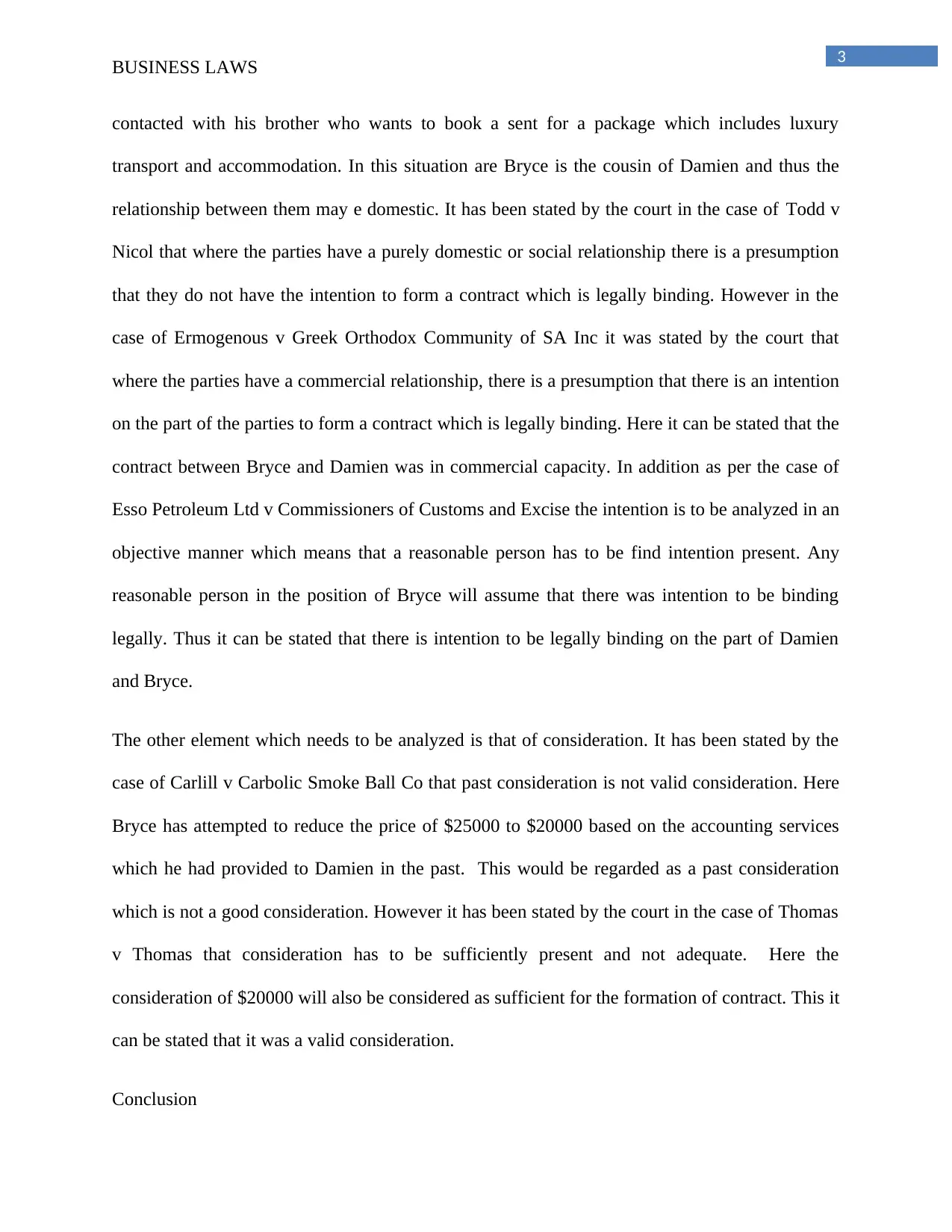
3
BUSINESS LAWS
contacted with his brother who wants to book a sent for a package which includes luxury
transport and accommodation. In this situation are Bryce is the cousin of Damien and thus the
relationship between them may e domestic. It has been stated by the court in the case of Todd v
Nicol that where the parties have a purely domestic or social relationship there is a presumption
that they do not have the intention to form a contract which is legally binding. However in the
case of Ermogenous v Greek Orthodox Community of SA Inc it was stated by the court that
where the parties have a commercial relationship, there is a presumption that there is an intention
on the part of the parties to form a contract which is legally binding. Here it can be stated that the
contract between Bryce and Damien was in commercial capacity. In addition as per the case of
Esso Petroleum Ltd v Commissioners of Customs and Excise the intention is to be analyzed in an
objective manner which means that a reasonable person has to be find intention present. Any
reasonable person in the position of Bryce will assume that there was intention to be binding
legally. Thus it can be stated that there is intention to be legally binding on the part of Damien
and Bryce.
The other element which needs to be analyzed is that of consideration. It has been stated by the
case of Carlill v Carbolic Smoke Ball Co that past consideration is not valid consideration. Here
Bryce has attempted to reduce the price of $25000 to $20000 based on the accounting services
which he had provided to Damien in the past. This would be regarded as a past consideration
which is not a good consideration. However it has been stated by the court in the case of Thomas
v Thomas that consideration has to be sufficiently present and not adequate. Here the
consideration of $20000 will also be considered as sufficient for the formation of contract. This it
can be stated that it was a valid consideration.
Conclusion
BUSINESS LAWS
contacted with his brother who wants to book a sent for a package which includes luxury
transport and accommodation. In this situation are Bryce is the cousin of Damien and thus the
relationship between them may e domestic. It has been stated by the court in the case of Todd v
Nicol that where the parties have a purely domestic or social relationship there is a presumption
that they do not have the intention to form a contract which is legally binding. However in the
case of Ermogenous v Greek Orthodox Community of SA Inc it was stated by the court that
where the parties have a commercial relationship, there is a presumption that there is an intention
on the part of the parties to form a contract which is legally binding. Here it can be stated that the
contract between Bryce and Damien was in commercial capacity. In addition as per the case of
Esso Petroleum Ltd v Commissioners of Customs and Excise the intention is to be analyzed in an
objective manner which means that a reasonable person has to be find intention present. Any
reasonable person in the position of Bryce will assume that there was intention to be binding
legally. Thus it can be stated that there is intention to be legally binding on the part of Damien
and Bryce.
The other element which needs to be analyzed is that of consideration. It has been stated by the
case of Carlill v Carbolic Smoke Ball Co that past consideration is not valid consideration. Here
Bryce has attempted to reduce the price of $25000 to $20000 based on the accounting services
which he had provided to Damien in the past. This would be regarded as a past consideration
which is not a good consideration. However it has been stated by the court in the case of Thomas
v Thomas that consideration has to be sufficiently present and not adequate. Here the
consideration of $20000 will also be considered as sufficient for the formation of contract. This it
can be stated that it was a valid consideration.
Conclusion
Paraphrase This Document
Need a fresh take? Get an instant paraphrase of this document with our AI Paraphraser
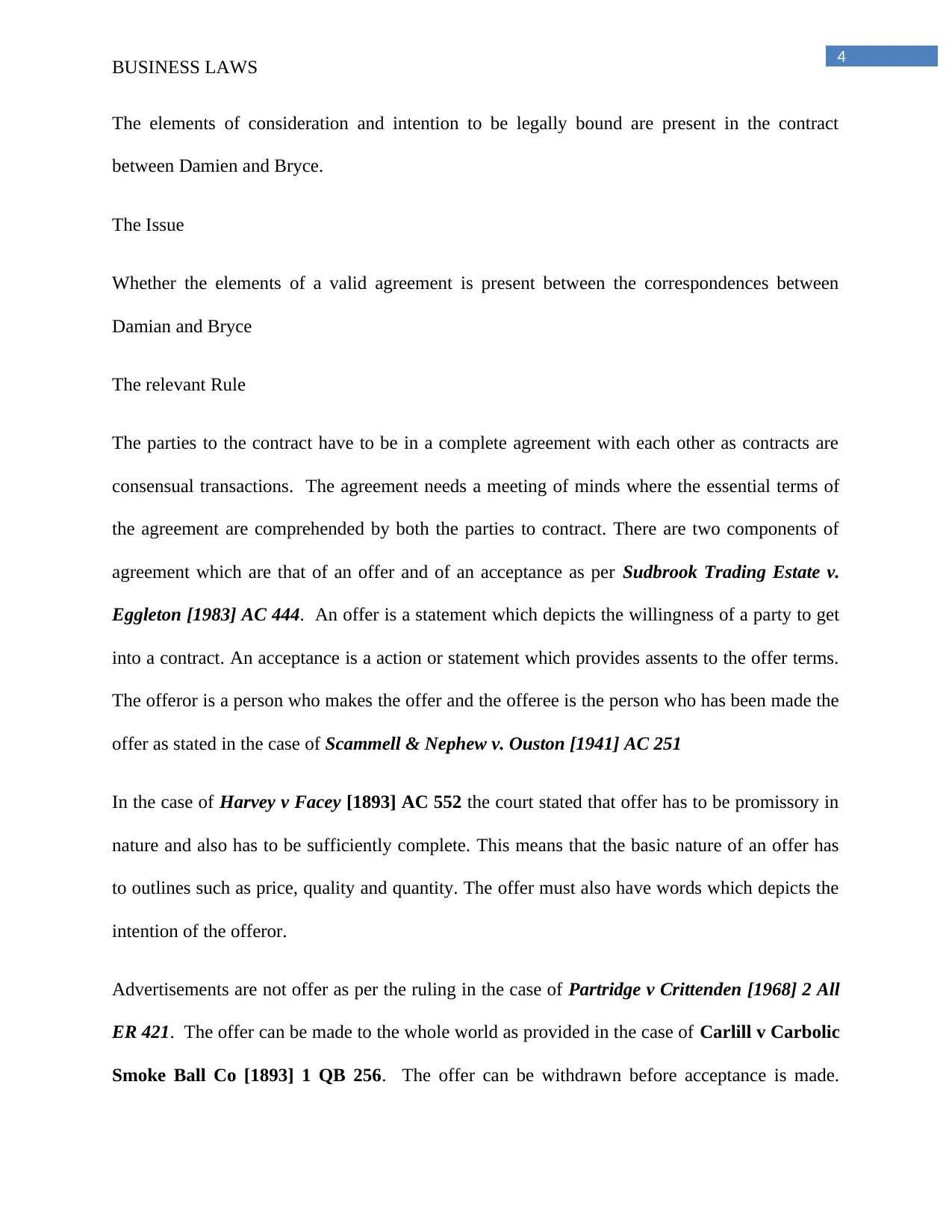
4
BUSINESS LAWS
The elements of consideration and intention to be legally bound are present in the contract
between Damien and Bryce.
The Issue
Whether the elements of a valid agreement is present between the correspondences between
Damian and Bryce
The relevant Rule
The parties to the contract have to be in a complete agreement with each other as contracts are
consensual transactions. The agreement needs a meeting of minds where the essential terms of
the agreement are comprehended by both the parties to contract. There are two components of
agreement which are that of an offer and of an acceptance as per Sudbrook Trading Estate v.
Eggleton [1983] AC 444. An offer is a statement which depicts the willingness of a party to get
into a contract. An acceptance is a action or statement which provides assents to the offer terms.
The offeror is a person who makes the offer and the offeree is the person who has been made the
offer as stated in the case of Scammell & Nephew v. Ouston [1941] AC 251
In the case of Harvey v Facey [1893] AC 552 the court stated that offer has to be promissory in
nature and also has to be sufficiently complete. This means that the basic nature of an offer has
to outlines such as price, quality and quantity. The offer must also have words which depicts the
intention of the offeror.
Advertisements are not offer as per the ruling in the case of Partridge v Crittenden [1968] 2 All
ER 421. The offer can be made to the whole world as provided in the case of Carlill v Carbolic
Smoke Ball Co [1893] 1 QB 256. The offer can be withdrawn before acceptance is made.
BUSINESS LAWS
The elements of consideration and intention to be legally bound are present in the contract
between Damien and Bryce.
The Issue
Whether the elements of a valid agreement is present between the correspondences between
Damian and Bryce
The relevant Rule
The parties to the contract have to be in a complete agreement with each other as contracts are
consensual transactions. The agreement needs a meeting of minds where the essential terms of
the agreement are comprehended by both the parties to contract. There are two components of
agreement which are that of an offer and of an acceptance as per Sudbrook Trading Estate v.
Eggleton [1983] AC 444. An offer is a statement which depicts the willingness of a party to get
into a contract. An acceptance is a action or statement which provides assents to the offer terms.
The offeror is a person who makes the offer and the offeree is the person who has been made the
offer as stated in the case of Scammell & Nephew v. Ouston [1941] AC 251
In the case of Harvey v Facey [1893] AC 552 the court stated that offer has to be promissory in
nature and also has to be sufficiently complete. This means that the basic nature of an offer has
to outlines such as price, quality and quantity. The offer must also have words which depicts the
intention of the offeror.
Advertisements are not offer as per the ruling in the case of Partridge v Crittenden [1968] 2 All
ER 421. The offer can be made to the whole world as provided in the case of Carlill v Carbolic
Smoke Ball Co [1893] 1 QB 256. The offer can be withdrawn before acceptance is made.
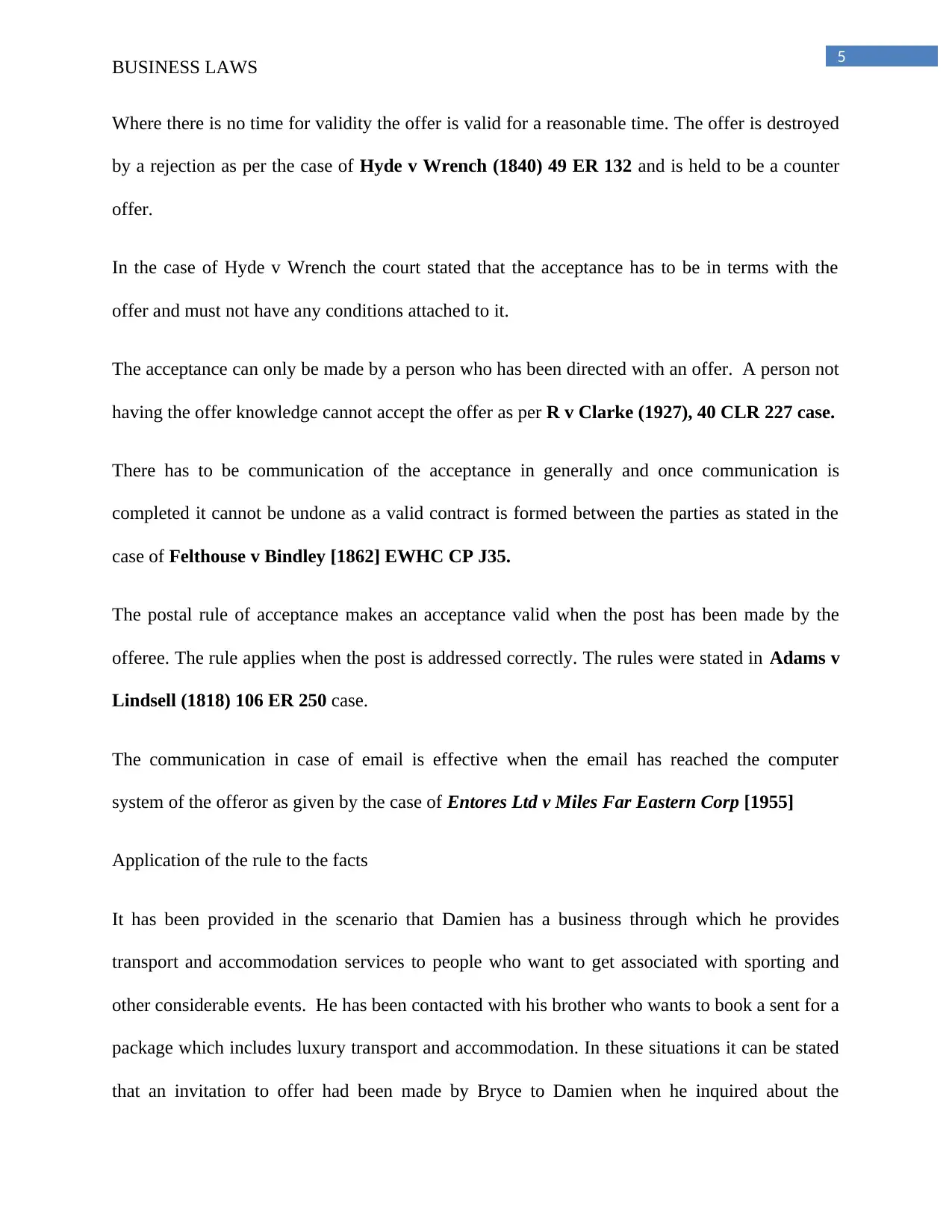
5
BUSINESS LAWS
Where there is no time for validity the offer is valid for a reasonable time. The offer is destroyed
by a rejection as per the case of Hyde v Wrench (1840) 49 ER 132 and is held to be a counter
offer.
In the case of Hyde v Wrench the court stated that the acceptance has to be in terms with the
offer and must not have any conditions attached to it.
The acceptance can only be made by a person who has been directed with an offer. A person not
having the offer knowledge cannot accept the offer as per R v Clarke (1927), 40 CLR 227 case.
There has to be communication of the acceptance in generally and once communication is
completed it cannot be undone as a valid contract is formed between the parties as stated in the
case of Felthouse v Bindley [1862] EWHC CP J35.
The postal rule of acceptance makes an acceptance valid when the post has been made by the
offeree. The rule applies when the post is addressed correctly. The rules were stated in Adams v
Lindsell (1818) 106 ER 250 case.
The communication in case of email is effective when the email has reached the computer
system of the offeror as given by the case of Entores Ltd v Miles Far Eastern Corp [1955]
Application of the rule to the facts
It has been provided in the scenario that Damien has a business through which he provides
transport and accommodation services to people who want to get associated with sporting and
other considerable events. He has been contacted with his brother who wants to book a sent for a
package which includes luxury transport and accommodation. In these situations it can be stated
that an invitation to offer had been made by Bryce to Damien when he inquired about the
BUSINESS LAWS
Where there is no time for validity the offer is valid for a reasonable time. The offer is destroyed
by a rejection as per the case of Hyde v Wrench (1840) 49 ER 132 and is held to be a counter
offer.
In the case of Hyde v Wrench the court stated that the acceptance has to be in terms with the
offer and must not have any conditions attached to it.
The acceptance can only be made by a person who has been directed with an offer. A person not
having the offer knowledge cannot accept the offer as per R v Clarke (1927), 40 CLR 227 case.
There has to be communication of the acceptance in generally and once communication is
completed it cannot be undone as a valid contract is formed between the parties as stated in the
case of Felthouse v Bindley [1862] EWHC CP J35.
The postal rule of acceptance makes an acceptance valid when the post has been made by the
offeree. The rule applies when the post is addressed correctly. The rules were stated in Adams v
Lindsell (1818) 106 ER 250 case.
The communication in case of email is effective when the email has reached the computer
system of the offeror as given by the case of Entores Ltd v Miles Far Eastern Corp [1955]
Application of the rule to the facts
It has been provided in the scenario that Damien has a business through which he provides
transport and accommodation services to people who want to get associated with sporting and
other considerable events. He has been contacted with his brother who wants to book a sent for a
package which includes luxury transport and accommodation. In these situations it can be stated
that an invitation to offer had been made by Bryce to Damien when he inquired about the
⊘ This is a preview!⊘
Do you want full access?
Subscribe today to unlock all pages.

Trusted by 1+ million students worldwide
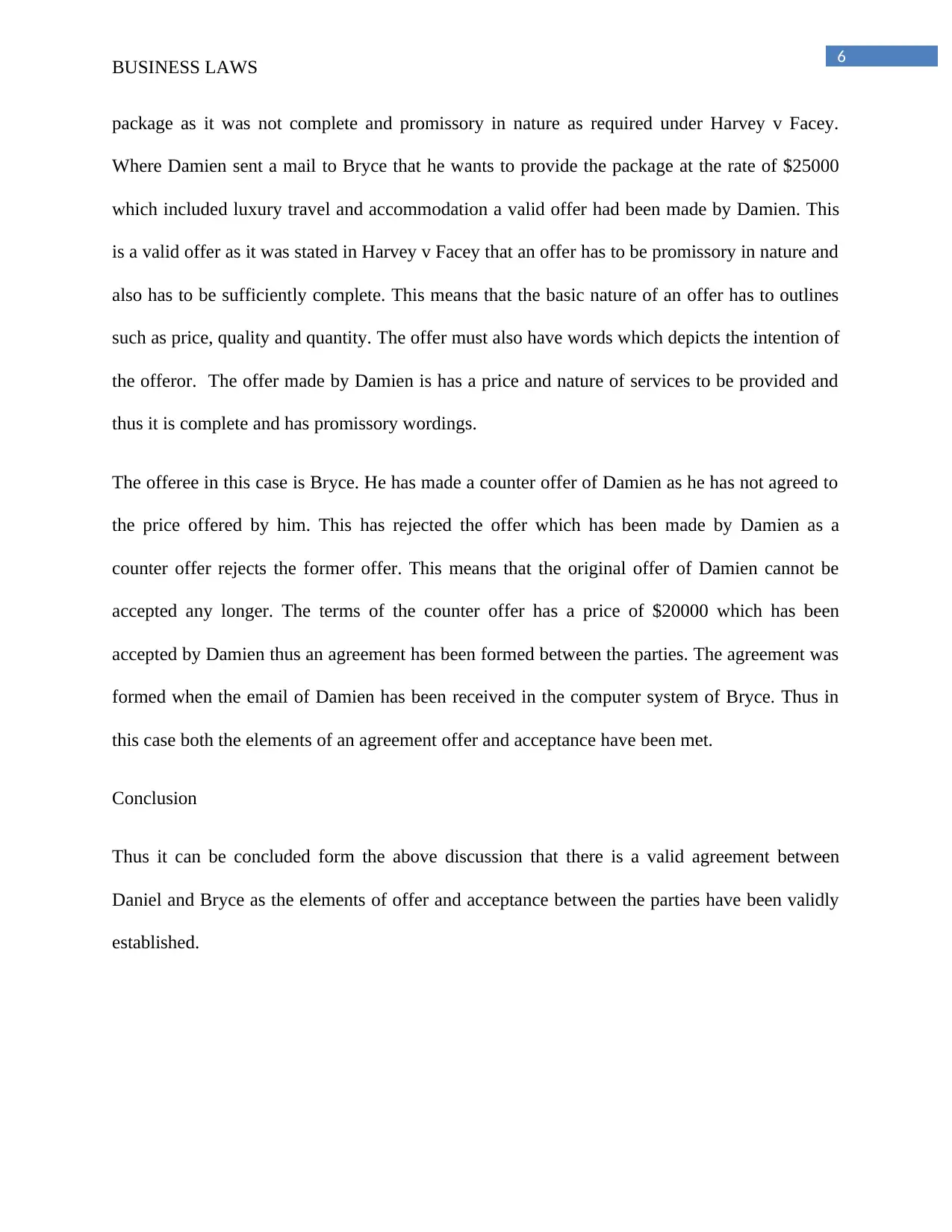
6
BUSINESS LAWS
package as it was not complete and promissory in nature as required under Harvey v Facey.
Where Damien sent a mail to Bryce that he wants to provide the package at the rate of $25000
which included luxury travel and accommodation a valid offer had been made by Damien. This
is a valid offer as it was stated in Harvey v Facey that an offer has to be promissory in nature and
also has to be sufficiently complete. This means that the basic nature of an offer has to outlines
such as price, quality and quantity. The offer must also have words which depicts the intention of
the offeror. The offer made by Damien is has a price and nature of services to be provided and
thus it is complete and has promissory wordings.
The offeree in this case is Bryce. He has made a counter offer of Damien as he has not agreed to
the price offered by him. This has rejected the offer which has been made by Damien as a
counter offer rejects the former offer. This means that the original offer of Damien cannot be
accepted any longer. The terms of the counter offer has a price of $20000 which has been
accepted by Damien thus an agreement has been formed between the parties. The agreement was
formed when the email of Damien has been received in the computer system of Bryce. Thus in
this case both the elements of an agreement offer and acceptance have been met.
Conclusion
Thus it can be concluded form the above discussion that there is a valid agreement between
Daniel and Bryce as the elements of offer and acceptance between the parties have been validly
established.
BUSINESS LAWS
package as it was not complete and promissory in nature as required under Harvey v Facey.
Where Damien sent a mail to Bryce that he wants to provide the package at the rate of $25000
which included luxury travel and accommodation a valid offer had been made by Damien. This
is a valid offer as it was stated in Harvey v Facey that an offer has to be promissory in nature and
also has to be sufficiently complete. This means that the basic nature of an offer has to outlines
such as price, quality and quantity. The offer must also have words which depicts the intention of
the offeror. The offer made by Damien is has a price and nature of services to be provided and
thus it is complete and has promissory wordings.
The offeree in this case is Bryce. He has made a counter offer of Damien as he has not agreed to
the price offered by him. This has rejected the offer which has been made by Damien as a
counter offer rejects the former offer. This means that the original offer of Damien cannot be
accepted any longer. The terms of the counter offer has a price of $20000 which has been
accepted by Damien thus an agreement has been formed between the parties. The agreement was
formed when the email of Damien has been received in the computer system of Bryce. Thus in
this case both the elements of an agreement offer and acceptance have been met.
Conclusion
Thus it can be concluded form the above discussion that there is a valid agreement between
Daniel and Bryce as the elements of offer and acceptance between the parties have been validly
established.
Paraphrase This Document
Need a fresh take? Get an instant paraphrase of this document with our AI Paraphraser
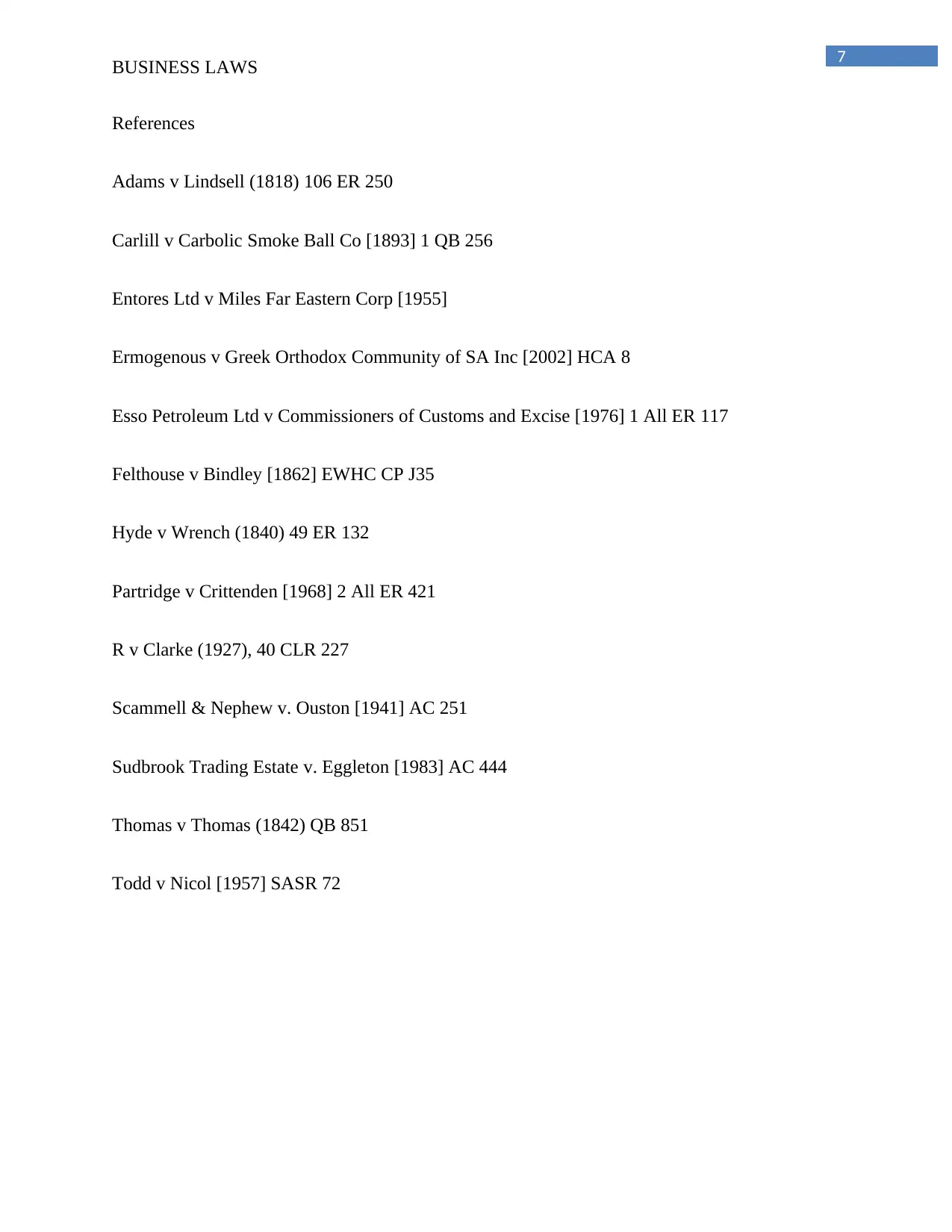
7
BUSINESS LAWS
References
Adams v Lindsell (1818) 106 ER 250
Carlill v Carbolic Smoke Ball Co [1893] 1 QB 256
Entores Ltd v Miles Far Eastern Corp [1955]
Ermogenous v Greek Orthodox Community of SA Inc [2002] HCA 8
Esso Petroleum Ltd v Commissioners of Customs and Excise [1976] 1 All ER 117
Felthouse v Bindley [1862] EWHC CP J35
Hyde v Wrench (1840) 49 ER 132
Partridge v Crittenden [1968] 2 All ER 421
R v Clarke (1927), 40 CLR 227
Scammell & Nephew v. Ouston [1941] AC 251
Sudbrook Trading Estate v. Eggleton [1983] AC 444
Thomas v Thomas (1842) QB 851
Todd v Nicol [1957] SASR 72
BUSINESS LAWS
References
Adams v Lindsell (1818) 106 ER 250
Carlill v Carbolic Smoke Ball Co [1893] 1 QB 256
Entores Ltd v Miles Far Eastern Corp [1955]
Ermogenous v Greek Orthodox Community of SA Inc [2002] HCA 8
Esso Petroleum Ltd v Commissioners of Customs and Excise [1976] 1 All ER 117
Felthouse v Bindley [1862] EWHC CP J35
Hyde v Wrench (1840) 49 ER 132
Partridge v Crittenden [1968] 2 All ER 421
R v Clarke (1927), 40 CLR 227
Scammell & Nephew v. Ouston [1941] AC 251
Sudbrook Trading Estate v. Eggleton [1983] AC 444
Thomas v Thomas (1842) QB 851
Todd v Nicol [1957] SASR 72
1 out of 8
Related Documents
Your All-in-One AI-Powered Toolkit for Academic Success.
+13062052269
info@desklib.com
Available 24*7 on WhatsApp / Email
![[object Object]](/_next/static/media/star-bottom.7253800d.svg)
Unlock your academic potential
Copyright © 2020–2026 A2Z Services. All Rights Reserved. Developed and managed by ZUCOL.



